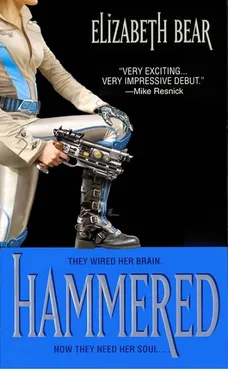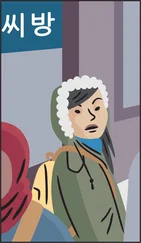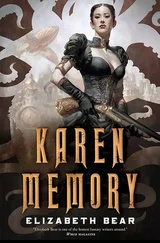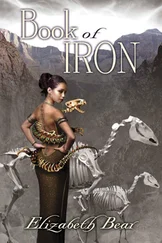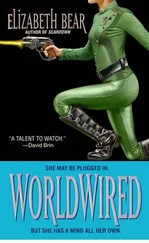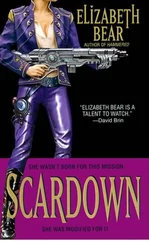“You wanna avenge a dead cop, Mitch, I’m not who you’re looking for. Get a ronin. I hear Bobbi Yee is good.” Why is he coming to me for this? Why is he off the investigation?
She must have been a partner. A friend. Or even dirtier than the general run, and they’re covering it up. I’d like to say that sort of thing never went on back home in Kahnawá:ke, but I’d be lying. Warrior ethos. Whatever.
For some reason, a great and sudden guilt washes over me. My long-dead little sister, Nell, gave me something priceless when I went into the army, and I haven’t been taking care of it. Maybe I’ll burn some tobacco after Mitch leaves. As if he wasn’t burning enough already.
“Don’t need a hit. I need information.”
“So tell me your girl’s name, Kozlowski.”
He laughs bitterly. “Mashaya Duclose. West Indian. You heard of her? She was a good cop, Maker.”
I haven’t heard of her, but I don’t know everybody. Sure. They’re all good cops when they’re dead.
Mitch continues. “She’d been supposed to meet up with your boy Razorface the night she vanished. Something about him having witnessed one of the kids who got hammered, and some question about whether his organization might be involved. You know about the OD’s?”
“I’ve heard stuff.”
He spreads his hands wide, helplessly, and the look that breaks through his veneer chills me. You get to know that expression, after a while. You see it on the ones who’ve adopted goals other than survival. Dead men walking.
“Look, Maker. I’ve got a dead detective. I’ve got Razorface maybe linked to a murder. And not one of his little cleanup killings. I don’t give a damn about those. A dead cop. A dead cop is not good for you and it is not good for me and it is not good for your gangster boyfriend. And a street full of dead kids poisoned by Canadian special forces combat drugs — that’s not good for you either, since I know how much you like people poking into your history. No?”
Mitch’s eyes flicker around my shop in that way he has, recording everything. I’m damned glad I took that little plastic twist elsewhere. Which reminds me, I need to call Simon. He’s had four days to get that stuff checked out.
I shrug. Our eyes meet: I see him in living color on the right side, and in high-resolution black and white complete with thermal readings and a heads-up array on the left. The bulge of his gun glimmers red on the threat display. Distracting. “It isn’t about that, Mitch.”
“Good. Then are you going to help me or not?”
Avatar Gamespace
Deadwood Base
Circa A.D. 3400 (Virtual Clock)
Interaction logged Tuesday 4 September, 2062, 0230 hours
A cold wind swirled the tall stranger’s coat around his boots as he pushed open the door of the saloon and stepped inside. Just for a moment the resolution flickered; then the illusion sealed itself around his presence, whole.
He paused for a moment inside the door, scanning the hodgepodge of cyborgs, Beautiful People, and aliens that populated the seediest bar in the seediest spaceport in Avatar Gamespace — each more improbably constructed than the last. A thin smile bent his lips and thoughtful eyes squinted under a thatch of wavy silver hair; the extreme body-modification crowd got even more extreme, in VR. A holstered equation hung at his hip, and his pockets were heavy with binary. His eyes lighted as they fastened on the bartender, and he came up against the brass rail like a knife against a butcher’s steel while patrons turned to look, and just as quickly turned away.
“Gunslinger?” the weathered bartender asked, sliding a shot of whiskey across the scarred mahogany surface.
A translucent blue rill of light followed the vector of the glass, and the stranger pursed his lips in approval as he lifted it. “Physicist,” he replied. “Nice effect. You’re a player-character, aren’t you? Not an extra?”
The bartender nodded. “Glad you like it.” He blew on his fingertips, and sparks fluttered from them — blue, shift-ing green and golden as they showered the floor. “Tolbert equations.”
The stranger stepped on one. It squeaked slightly in protest under his boot before it died. “I know,” he said, and — turning — leaned back against the gouged brass railing. “You’re a mathematician in real life?”
“Physician. Neurologist.”
The stranger laughed lightly, as if some assumption had been satisfied. “Math is a hobby?”
“Yes.”
“Me, too.” Most of the saloon’s patrons affected a self-consciously reserved demeanor, but the stranger seemed incapable of standing still. He finished his drink quickly and glanced over his shoulder at the bartender. “Do you ever get pilots in this bar?”
The bartender shrugged. “Isn’t everybody in here a pilot? Or wants to be? With a couple of exceptions.” He tapped the tip of his own nose.
The stranger’s long, narrow fingers drummed the countertop. “Why are you playing the bartender?”
“Because I like to role-play, and I don’t like to fight. Even virtually.” The bartender shrugged. “I’m not trying to win, I’m just here for the scenery and the conversation.” He wiped his right hand on his apron and stuck it out. “It picks up about now — most of the kids are in bed. My handle’s ‘Simple Simon.’ Pleased to make the acquaintance of somebody who doesn’t take all this too seriously.”
The stranger nodded and took the hand. “Dick Feynman.”
“Really?”
“Yes. Why?”
“There used to be a physicist by that name back in the 1950s or ’60s.”
The stranger shrugged. The corners of his mouth slanted up, complicating the web of lines decorating his lean face. “I know.” A pause. “I’m a descendant.”
“Ah.” He polished the bar. “What’s a physicist doing hanging out in cyberspace with a bunch of teenagers?”
“Same thing a neurologist is. And as you pointed out, most of the kids are in bed by now.” A trail of imperfect pixilation followed Feynman’s head as he cocked it to the side like a curious bird. “I don’t so much come for the game either, although it’s fun to watch. I bet I could beat it if I thought about it long enough.”
The bartender hung his rag behind the bar. “Probably. Want another drink?”
“Sure.” Feynman slid another chit across the counter, and the bartender shook his head and pushed the chit back. “Don’t worry about it. I’m really not trying to win. I’m thirty-seven, chubby, and divorced. Even make-believe pilot-training isn’t really my thing.”
The physicist chuckled and gestured to the wiry, white-haired icon of the bartender. “I take it that’s not your real face, then? Most people don’t choose icons that much older than themselves. It’s usually bigger muscles, prettier faces.”
“Not even a little does it look like me. I’m playing to the archetype. You’d be amazed how many people assume I’m an extra. And the things they’ll tell a computer. Like they don’t realize everything that happens in here is logged in some data array.” He scratched the receding line of his hair. “But you know, everybody wants to talk to the bartender.”
“I would think neurology would be more interesting than this.” Feynman took his drink and rolled the glass between virtual fingers. He raised it up to the light, as if examining the color.
“Neurology is this, these days. Okay, not precisely true — but you know about the latest work in VR, yes? Direct cortical stimulation? Big help with severely impaired patients.”
“I’ve heard something,” Feynman answered. “Are you using a gloves-and-goggles setup now?”
Читать дальше
